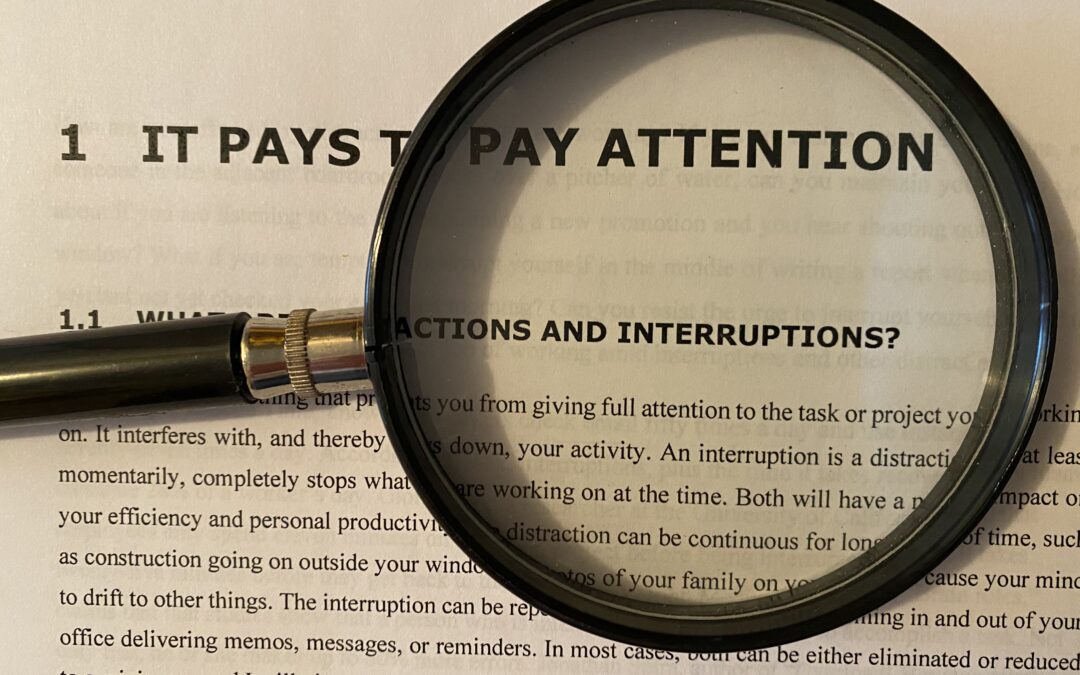You have probably heard this many times before. The brain cannot multitask; it operates sequentially and can only focus its attention on one thing at a time. You may think you are doing two things at the same time, such as reading this article while listening to a podcast, but your brain is switching rapidly back and forth from one task to the other. Fragments of information are lost from both activities and missed information could be essential to clearly understanding both the podcast and the article. Not only that, but you are also less likely to remember what you have read and heard. That’s why we must never combine tasks or activities that both require the attention of your brain.
I know in the past we assumed that if only one thing requires your attention it was okay. The problem is that everything involves the attention of our brain to some degree, even reading a book while your laundry dries, or traveling on a train, or waiting in a doctor’s office. Let me clarify that. It doesn’t necessarily require your attention, but it demands your attention.
We normally don’t refer to those things as multitasking, because, theoretically, one of those activities does not require the attention of your brain. I say theoretically, because knowing human nature, I can assure you that you will be intermittently looking out the train window, or wondering whether the dryer has completed its cycle, or shifting your attention every time someone else enters the waiting room. We call that “task switching,” and that’s the same thing that happens when you are talking on the cell phone while driving or any other activity when the attention of your brain is involved. I admit it is less distracting to be doing only one thing, but it depends on your ability to focus and your self-control related to that one thing.
The exception is when both your focus and self-control are so strong, you can completely block out one activity or the other.
Focus is like a cognitive muscle that can be strengthened through practice. When you are working in today’s business environment with its digital devices, incessant interruptions, hectic pace, and people’s impatience, it is a challenge. And when you hear statistics, such as more than 50% of American workers saying they are interrupted, and that people switching back and forth between two separate tasks or problems take 25% longer to complete them, you can only imagine the negative impact on productivity and costs.
There is a difference between being distracted by something and being aware of it. For example, you can be aware that someone is making coffee in the room next to you without being distracted by it. And you can be aware of the person who just walked into your office to toss something into your in-basket without being interrupted by it. But it requires focus and self-control.
The distinction between being distracted or interrupted and being aware is simply that in the latter instance, you continue with whatever you are doing without having to reorient yourself to the task. There need be no lost time beyond a few seconds, and little loss of focus.
If you have a well-developed, brain-based skill of focus or “sustained attention,” you may be aware of sounds or motion around you, but can continue to focus on what you are reading without having to reread the paragraph to get the meaning, or in the case of a very weak focus, to have to snap out of a daydreaming episode to reread a paragraph that you don’t even remember having read.
A focused person can carry on a conversation with someone at a party, and not be picking up the conversations of other people, even if their name is mentioned. My e-book, Focus: How to Ignore Distractions, published by Bookboon, discusses focus and interruptions in detail.
One study indicated that we spend nearly half our waking hours in a daydreaming mode rather than being focused on the important things in our job and our lives. Probably some of this “off” time is warranted since focusing requires a lot of energy, and unless we keep recharging our energy or pacing ourselves so that less energy is consumed as we work, there will be none left. But we can certainly improve our efficiency and effectiveness if we were to (a) focus on the most important things, and (b) eliminate at least half the time that is currently being wasted through distraction or interruptioms.
Charles Duhigg, in his book, Smarter, Faster, Better, mentions that researchers have found that determined and focused people tend to work harder and get tasks done more promptly. They often have higher paying jobs, have deeper networks of friends, and stay married longer.
But Chris Bailey, in his book, The Productivity Project, claims that research shows we only focus on what is in front of us 53% of the time. Let’s see if we can improve on that.


Recent Comments